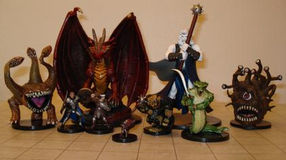Gamestorming #6: Characters
- Caity Kelly
- Mar 6, 2019
- 2 min read

How does one go about creating a character? This is a concept that has always interested me. When I was a high school student participating in my local speech and debate club, I wrote my illustrated oratory speech on meaningful character creation and spent a fair amount of time pondering the development of well-known characters across different media. There are so many to choose from--some loved, some hated, some well-written, and some poorly-designed. The idea of "character" becomes particularly interesting as it pertains to the world of gaming.
In the 2008 book by Tracey Fullerton and Christopher Swain, Game Design Workshop: A Playcentric Approach to Creating Innovative Games, the author describes characters as "agents" through whom the story is told (pg. 96). This is something that well-describes movies, book, and television characters as well; however, games add a new dimension to the situation.
In games, we essentially become part of the character by having some degree of control over them. In some games, their path is linear and predetermined. In others, we decide where to go. Either way, as Fullerton points out in her book, it is important that players establish some degree of empathy for the player character (2008; pg. 98).
Again, Fullerton (2008) provides us with some apt questions for addressing the creation of such characters: What are their desires, needs, strengths, and weaknesses? What drives them toward the end goal and what is that end goal? (pg. 97). As someone who has had experience making characters for Tabletop RPGs and mystery dinner games, I know that it is sorely tempting to immediately jump into the aesthetic design of the character. However, it is more important to nail down these aspects first because they can have a large influence on virtually all aspects of the character--including appearance.
Consider this: How simple or your complex is your character going to be? This can affect if your game is going to be a full-fledged adventure game with intricate combat systems or a simple point-and-click game. Does your character have any significant events in their backstory that shape who they are? This can affect personality, decisions, interactions, strengths, weaknesses, desires, fears, end goals, appearances...virtually anything. How powerful is your character at this point? This affects the balance of your game and the power level of the player character, enemies, and NPCs around you.
While the Bloom's Taxonomy game I am working on does not currently utilize characters, this is always something I am keeping track of in the game world. A well-made character game easily boost the enjoyment of one's game and, on the flip side, a poorly-made character can frustrate players to no end. It is therefore important that we devote ample time to creating our fictional people as well as the game itself.
References:
Fullerton, T., & Swain, C. (2008). In Fullerton T., Swain C.
(Eds.), Chapter 4 - working with dramatic elements. Boston:
Morgan Kaufmann. doi:https://doi.org/10.1016/B978-0-240-
80974-8.50010-5


Comments